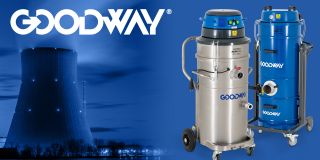10 CFR Part 810 and You: A Successful ANS Webinar
by Will Davis
On Thursday, March 26, 2015, the American Nuclear Society held an exclusive, members-only webinar with senior Department of Energy officials for the benefit of ANS members who wished to learn more about recent rule changes (covered by Federal Regulation known as 10 CFR Part 810) that will affect the export of nuclear information and technologies from the United States.
Richard S. Goorevich, Director, Office of International Regimes and Agreements, US DOE National Nuclear Security Agency, and Katie Strangis, NNSA Senior Policy Advisor, were the featured speakers. Craig Piercy, ANS Washington Representative, and Art Wharton, ANS Public Policy Committee member, were the hosts on behalf of ANS.
Goorevich opened the Q&A session by pointing out that the DOE does not view the new Part 810 legislation as just a DOE regulation, but rather as a regulation written for and accommodating the entire US civil nuclear industry. He stated that one of the priorities of the DOE is to develop a modern, streamlined, computerized export licensing system "that the Department of Commerce and the NRC (US Nuclear Regulatory Commission) will be envious of." According to Goorevich, Secretary of Energy Ernest Moniz has made this system a top priority, and has called "all hands on deck" to get it implemented and operational. The DOE is reportedly "pleasantly surprised at the first phase of testing." Goorevich added that the DOE received a volume of comments asking for a "better, more efficient process" during the open commenting period.
Strangis indicated that in the future the DOE will strive to have the most open and transparent Part 810 meetings possible, and that there would be "no more secret Part 810 meetings with anyone." She said that the DOE is actively engaging industry and the public on the rule changes, and that people should regularly check the DOE website for events, speaking events around the country, and more outreach, all being done in an effort to make the widely revised rule as accessible as is possible.
Goorevich was asked to summarize the outstanding Part 810 changes. He indicated that the DOE has made an effort to clarify the entire process, both in technical and legal language, related to requirements of various rules and their scope. He noted that areas authorized for "fast track" review and authorization are now explicitly spelled out, as one example of this clarification. He said that they recognize that although the rule was written to regulate a very technical industry, it lacked a technical description.
Another major change was to alter the nature of the actual language of the regulation to be permissive, instead of restrictive-a move made in line with the President's Export Reform Control Initiative. The thrust of this change is to ensure that the DOE is approachable by industry, and that export of technology (within legal permissions) is viewed as an economic opportunity. "We want to be approached," Goorevich said. "We really want to be able to work with applicants and make cooperative ideas move forward."
When asked about reporting activities (under Part 810/11 and 810/12), Goorevich replied that reports should "provide us and the user of the general authorization with enough clarity and surety over cooperation that everyone understands the rules of the road. There's no need to report, under a general authorization, all the data created in a joint project. We need enough detail only to be able to say 'yes, this activity is generally authorized,' and ensure that we understand that the applicant understands the rules." He said that reports can be short and concise, although in some cases applicants want to provide more detail than the minimum standard and do so.
The topic of fundamental research becoming controlled by 10 CFR Part 810 was another area of concern for the webinar attendees. The implication of this breakpoint is clear for labs as well as universities. Goorevich answered extensively on this subject, giving a specific example: A general metallurgical study of materials would not be controllable under Part 810, however, if that work then transitioned into a study of specific metal alloys to be used as pressure vessel steel in, for example, a fast reactor, then the work will have crossed the threshold of Part 810 control.
Goorevich said that the basic premise of this kind of decision normally is whether or not the information is publicly available-as in a paper produced by a university research team after performance of work, and then made public. Even some documents that are not public, such as standards for Probabilistic Risk Analysis, are actually available to the public (although for a very high price, making them accessible really only to corporations) and as such these also are not subject to any controls.

